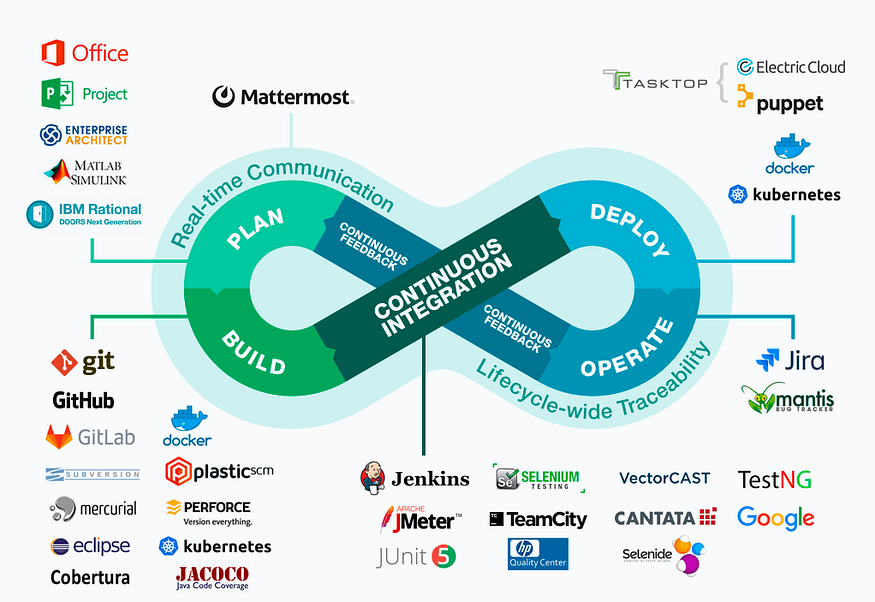🚀DevOps-Zero to Hero💡 Day 1: Introduction to DevOps

Hello and welcome to our month-long exploration into the world of DevOps! Over the next 30 days, we’re going to take a deep dive into DevOps, which is all about making teamwork between software developers and IT operations smoother. We’ll talk about its main ideas, goals, how people work together, using cool automation, and all the good things it brings to companies. Whether you’re someone who writes code, works in IT, or just likes learning new things, this course is going to teach you everything you need to know to use DevOps well.
Starting Strong: What DevOps Is All About
To kick things off, let’s start with the basics of DevOps. DevOps is a way of working that brings together software development — Dev (the people who make the programs) and IT operations — Ops (the people who keep everything running) to work better together. This helps make sure software gets made and delivered smoothly.
Getting to Know DevOps:
Breaking Down Walls: DevOps wants to break down the walls that sometimes separate developers and IT folks. When they talk more and work together, things get done better.
Always Building and Delivering: DevOps wants to make sure that software gets built, tested, and sent out often and automatically. This helps companies put out new stuff quickly and be flexible.
Thinking of Computers as Code: DevOps treats all the stuff that makes computers work (like setting them up and making them talk to each other) as if it were lines of code in a program. This makes things work smoothly and quickly.
Getting Friendly with DevOps Culture, Teamwork, and Automation:
Being Friends at Work: DevOps is also about getting along and working together in a good way. People who make software and those who make it work need to team up. This makes sure that everyone is on the same page, and things go smoothly.
Working Together: DevOps says that different groups of people should work together, like software people and IT folks. This helps to put code (the stuff that makes programs) into action in a smooth and quick way.
Letting Computers Do the Boring Stuff: Another big thing is letting computers do the boring and repetitive jobs. This saves time, stops mistakes, and lets everyone do more important things. For instance, setting up, testing, and delivering software can happen without people having to do everything manually.
Uncovering the Good Stuff: Why DevOps Is Awesome
Using DevOps has lots of great benefits for companies. Let’s check them out:
Getting Faster: With DevOps, things happen quickly. Developers and IT teams work together well, so new software can get out there faster. This helps companies keep up with what customers want and stay competitive.
Better Friends at Work: DevOps makes sure that everyone talks and gets along. This means fewer misunderstandings and better teamwork.
Stronger Software: DevOps uses automation and keeps a close eye on things. This helps catch problems early on, so software is better and more stable.
Getting More Done: Since boring tasks are automated, people can focus on important work. This makes everything work better and faster.
Wrapping Up Day 1: What’s Next?
We’ve learned a bunch about DevOps principles, goals, teamwork, and the magic of automation. Plus, we’ve seen how it helps companies in cool ways from the start. Tomorrow, we’re diving into Version Control Systems (VCS). So, remember to come back for Day 2 and keep learning with us!
Questions for the Curious Minds: Interview Edition
To challenge your brain and help you get ready for interviews, here are some interesting questions inspired by what we’ve covered:
- What is DevOps, and why is it important in modern software development?
- How can people from different teams work better together in a DevOps setup?
- What is the “DevOps culture,” and why is it considered crucial for successful DevOps implementation?
- Can you provide an example of a process or task that you automated in a previous project to improve efficiency?
- How do you know if a DevOps plan is working well and the software is good quality?
- How do you keep making things even better in a DevOps way?
- What would you do to make a company change the way they work to use DevOps?
Stay tuned for Day 2, where we’ll explore Version Control Systems (VCS)!
I hope you enjoyed this easy-to-follow read. Don’t forget to check in tomorrow for the next chapter in our 30-day DevOps adventure. Happy learning!
Please Like, Share & Follow if you like this post.



